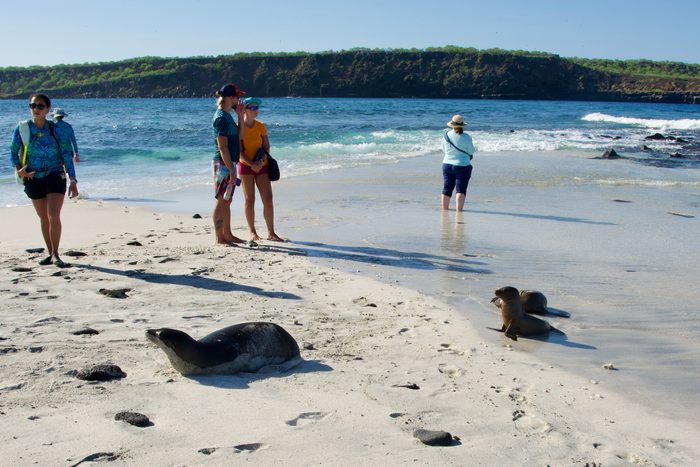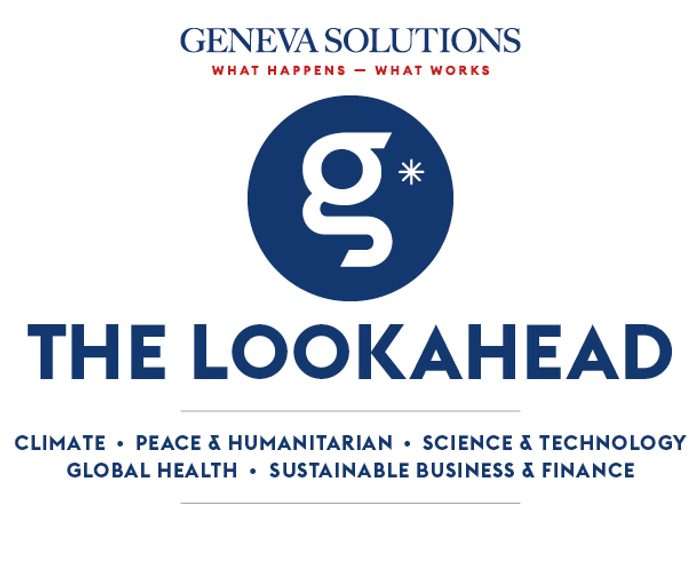Good morning, this is Paula. In the Galápagos Islands, where invasive species, human mobility, climate change and overfishing have accelerated natural evolution, international organisations are calling on measures in the hope of resetting the change.
And after failing last week to finalise a landmark agreement on preventing and preparing for future pandemics, countries have given themselves two more weeks at the end of April to mend their differences and strike a deal. |

|

Tourists and baby seals and their mother on Mosquera Island, Galápagos, 29 February 2024. (Geneva Solutions/Paula Dupraz-Dobias)
|
|
Human-driven environmental changes in Galápagos face global pushback.
Nearly 200 years after Charles Darwin visited the Galápagos Islands, providing the basis of his theory of evolution, Geneva Solutions visited the islands as they face their greatest environmental challenges yet. Amid Ecuador’s economic downturn and an unprecedented security crisis due to gang violence, the Galápagos National Park struggles to deal with issues including invasive species, pollution and overfishing. Meanwhile, international organisations and NGOs are saying the time has come for a policy reset before it’s too late.
Geneva Solutions (EN)
|
|
|
😷Pandemic accord discord.
“There is no champagne,” said Roland Driece, co-chair of the body tasked with overseeing negotiations for an international accord on handling future pandemics, after the supposed final round of talks ended on Thursday without a deal. Instead, weary member states have resolved to meet for an extra two weeks from 29 April – the hope being that they will settle their differences and approve the final text ahead of its adoption at the World Health Assembly on 27 May. Even then, as Health Policy Watch reports, the best scenario is a bare-bones text that would be fleshed out over the next 12-24 months. The Intergovernmental Negotiating Body bureau, which is steering the talks, has between now and 18 April to draw up a new draft text.
|
|
💊Hard pill to swallow.
Two years have passed since negotiations began on drawing up a landmark agreement to prevent another Covid-19 crisis, with talks marked by disagreements between countries, in particular over provisions aimed at achieving a more equitable distribution of pandemic products and knowledge between countries. In an interview with Le Temps and translated by Geneva Solutions, Indian economist Jayati Ghosh, who served on the WHO-established Council on the Economics of Health for All, warns of the overweight influence multinational companies have had on negotiations.
|
|
🪖Arms ban calls.
As the Human Rights Council wraps up its meeting this week, the war in Gaza will enflame debates right until the bitter end. A yearly draft resolution, tabled by Pakistan on behalf of the Organisation of Islamic Cooperation, puts countries on the hook for providing weapons to Israel as the country lays waste to the enclave in pursuit of Hamas. The text also calls for an immediate ceasefire.
|
|
|
GS news is a new media project covering the world of international cooperation and development. Don’t hesitate to forward our newsletter!
Have a good day!
|

|
|
Avenue du Bouchet 2
1209 Genève
Suisse
|
|
|
|








